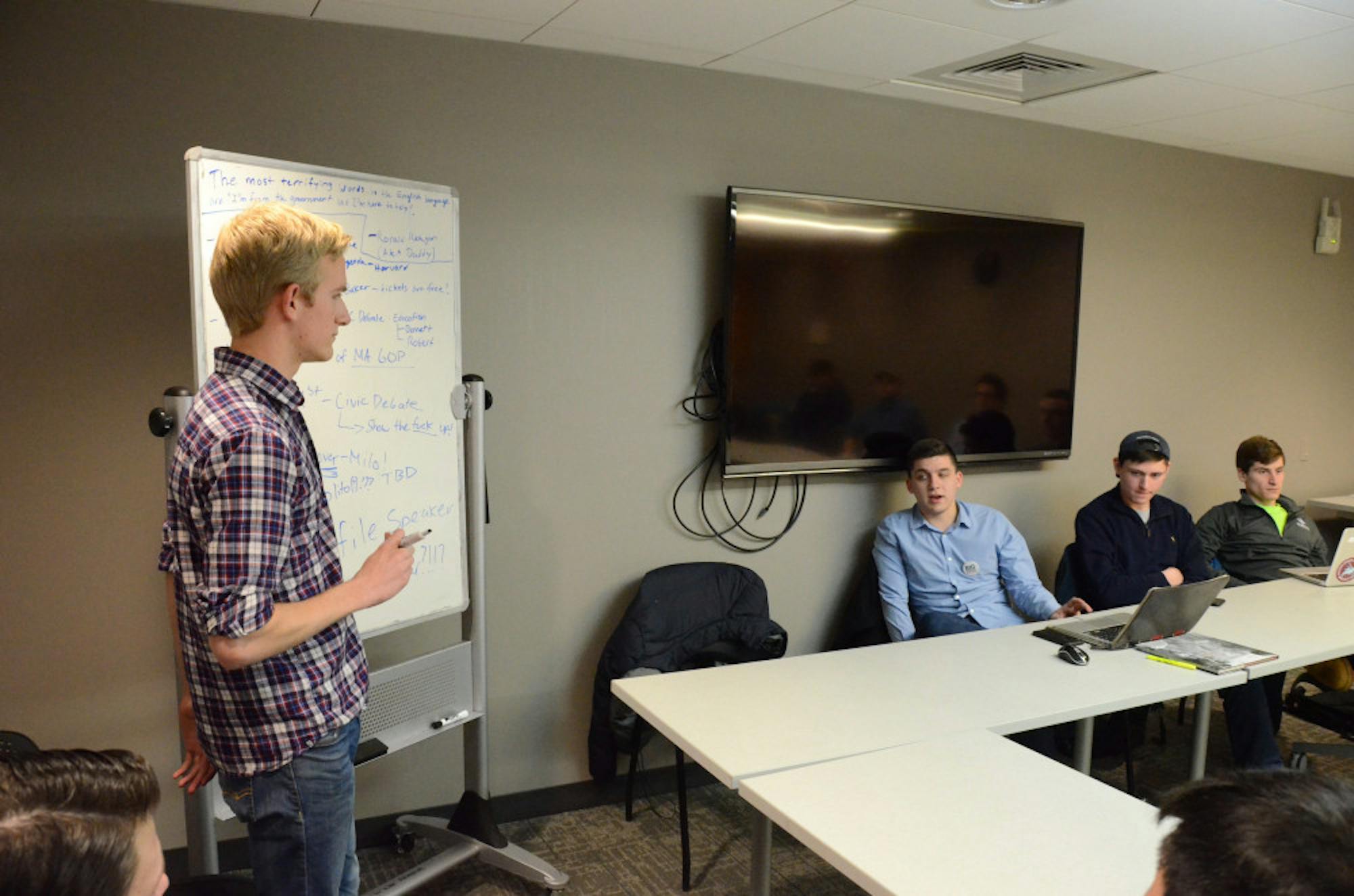Despite Tufts’ long-held reputation for having a predominantly liberal-leaning student body, students have been involved with Republican groups on campus since at least the 1890s, when there was at least one recorded student, Arthur Ames Hodgman, in the Tufts Republican Club. Since then, Tufts Republican clubs have served as political organizations for Republican-identifying and conservative-leaning students on campus.
Tufts Republicans, as the conservative student group is known today, has had a small membership for much of its history. Described as a “fairly quiet, inactive organization” in an April 22, 1997 Daily article, Tufts Republicans remained a small presence on campus throughout the early 2000s.
According to a Nov. 4, 2008 Daily article, then-President of Tufts Republicans Michael Hawley (LA '11) said the club had only about 25 active members at that time. Just two years later, a Nov. 28, 2010 Daily article said the club was “too small to effectively campaign on the Hill.”
Going into the 2012 election season, Tufts Republicans was still small, made up of about 10 to 12 students. The group focused its efforts on organizing for the Massachusetts elections. Club members explained in a Nov. 6, 2012 Daily article that they campaigned for Massachusetts Senate rather than the presidential race due to their small membership and the Tufts Democrats' larger presence on campus.
The years following the 2012 elections brought a lull in activity for the Tufts Republicans, in part because the club was in and out of official recognition from the university. Last school year, Tufts Republicans was de-recognized by the Tufts Community Union Judiciary (TCUJ) due to inactivity, according to George Behrakis, a first-year and current president of the Tufts Republicans.
“After the 2012 election, the club was sort of started. Before that, it had been in the weeds," Behrakis said. "Then in 2014 or 2015, it went under again and got de-recognized and sort of fell apart, even though they were having informal meetings."
Senior and PR Chair of Tufts Republicans Tomer Shapira joined the club when it was still de-recognized by the TCUJ.
“When I joined the club, the club technically didn't exist because it was de-recognized the previous year. The people who were running it during that time didn't do anything,” Shapira said. “All they did was party, they didn't do actual events ... As a result, they were de-recognized."
The club sought re-recognition last year, but it lacked the proper documentation, according to a Nov. 21, 2016 Daily article. However, after getting everything in order, the club was re-recognized by TCUJ this past fall.
The club has since grown in membership and activity after its re-recognition. Shapira estimates that around 74 students joined the Tufts Republicans' e-list this year, a growth unprecedented in the club’s history.
“Since the club got re-recognized last year, the club has been growing steadily. I think in the beginning of this year, there were maybe 80 people total and a lot of people joined in the beginning. I’d probably say [there was a] 25 percent growth after the election and into the second semester,” Behrakis said. “It's pretty significant.”
According to Behrakis, the majority of the current members are first-years, many of whom serve as leaders.
"[The president] George [Behrakis] is a freshman and our vice president is also a freshman, and the treasurer is a freshman," Shapira said. "It looks like a brand new club almost.”
The increase in membership especially took off after the 2016 presidential election and seems to be part of a regional, or even national, trend. According to a March 7 article in the Christian Science Monitor, Republican clubs at other Boston colleges, such as Boston University and Northeastern University, have experienced a similar uptick in membership since the election.
However, both Behrakis and Shapira believe that the Tufts Republicans' increase in membership is not only due to the election of President Trump, but also due to the timing of the club's re-recognition.
“We tabled at the club fair this past fall, which caused our club to explode in membership,” Shapira explained.
Behrakis noted that it is sometimes challenging to organize conservative activity at a predominantly liberal school.
“When ... it's not just that the majority is liberal, but the super-majority is liberal, the challenge is finding a way to counter the narrative because most of the people here ... believe similar things," he said. “There are certain things that are sort of taken to be the standard position on certain issues. The challenge we have is to change that, to provide an alternative that's viable because the narrative now is that their positions are right, ours are wrong -- or any number of other things.”
Shapira also commented on the prevailing liberal sentiment on campus, saying that while students sometimes react with surprise to his political views, he is never bothered by what others think of his beliefs.
Both Shapira and Behrakis described the Tufts Republicans' ongoing plans for the next school year, such as bringing more speakers to campus ranging from former or current Supreme Court justices to well-known commentators. Tufts Republicans plans to work with the Jonathan M. Tisch College of Civic Life and the Young Americans for Freedom to bring these speakers to Tufts.
As president of the club, Behrakis has his eyes on the organization's future. Aside from a possible speaker series, he is hoping to encourage more dialogue on campus among groups across the political spectrum.
“I’ve found that there are a lot of people who are not willing to talk to you and there are a lot of people who are actually willing to have a respectful discussion," Behrakis said. "They just haven't had a chance. Part of that is putting ourselves out there, because there are fewer of us than there are of them."
History on the Hill: Tufts Republicans






